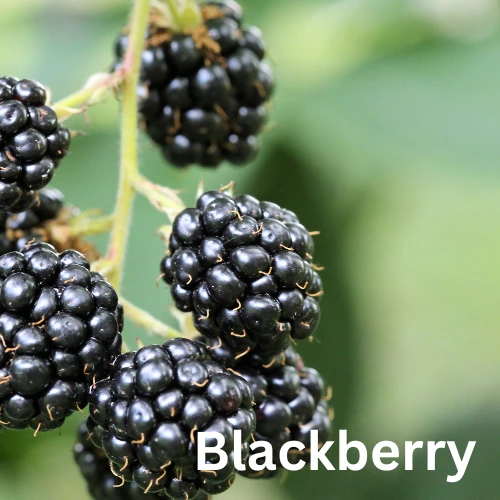Blackberry Benefits and Side Effects
Blackberries are a popular fruit that is loved by many for its sweet and tart taste. They are a great source of nutrients and are often used in cooking, baking, and as a garnish in drinks. But did you know that blackberries also have numerous health benefits and potential side effects? In this blog post, we will explore both the benefits and side effects of blackberries.
Benefits of Blackberries
Rich in antioxidants
Blackberries are rich in antioxidants such as anthocyanins, which give the fruit its deep purple color. Antioxidants are compounds that protect the body from damage caused by harmful molecules called free radicals. They can help reduce inflammation, prevent chronic diseases, and promote healthy aging.
Good source of fiber
Blackberries are a good source of fiber, with 8 grams of fiber per cup. Fiber is essential for digestive health and can help regulate blood sugar levels, lower cholesterol, and promote feelings of fullness and satiety.
May improve brain function
Blackberries contain polyphenols, which are compounds that can improve brain function and protect against cognitive decline. Studies have shown that polyphenols can enhance memory, attention, and learning.
May help reduce inflammation
Blackberries have anti-inflammatory properties that can help reduce inflammation in the body. Inflammation is a normal response to injury or infection, but chronic inflammation can lead to many health problems, including heart disease, diabetes, and cancer.
May promote healthy skin
Blackberries are rich in vitamin C, which is essential for the production of collagen, a protein that helps keep skin firm and youthful. Vitamin C also has antioxidant properties that can protect the skin from damage caused by the sun and other environmental factors.
Side Effects of Blackberries
Allergic reactions
Some people may be allergic to blackberries and may experience symptoms such as hives, itching, swelling, and difficulty breathing. If you experience any of these symptoms after consuming blackberries, seek medical attention immediately.
Stomach upset
Eating too many blackberries can cause stomach upset, such as diarrhea, bloating, and gas. This is because blackberries are high in fiber, and too much fiber can be difficult for some people to digest.
Interference with blood-thinning medications
Blackberries contain vitamin K, which can interfere with blood-thinning medications such as warfarin. If you are taking blood-thinning medications, it is important to consult with your doctor before consuming blackberries.
Dental problems
Blackberries are high in natural sugars, which can promote tooth decay and cavities. It is important to brush your teeth after consuming blackberries or any other sugary foods.
Pesticide exposure
Blackberries are often treated with pesticides to protect them from pests and diseases. It is important to wash blackberries thoroughly before consuming them to reduce the risk of pesticide exposure.
How to Incorporate Blackberries into Your Diet

Blackberries can be enjoyed in a variety of ways, including:
Eating them fresh
Fresh blackberries can be enjoyed as a snack or added to yogurt, oatmeal, or salads for a burst of flavor and nutrients.
Making smoothies
Blackberries can be blended with other fruits and vegetables to make a delicious and nutritious smoothie.
Baking with blackberries
Blackberries can be used in baking to make pies, tarts, muffins, and more.
Making jams and jellies
Blackberries can be made into jams and jellies that can be enjoyed on toast or as a topping for yogurt or ice cream.
What does the research say?
This study by the University of Arkansas is about the health benefits of blackberry fruit, which contains high levels of antioxidant compounds called anthocyanins, flavonols, and ellagitannins. These compounds are known to have a positive impact on the body, but there is still a lack of research about their specific health benefits, metabolism, bioavailability, and mechanism of action.
Despite this, some studies have shown that blackberry phenolic compounds can protect against age-related neurodegenerative diseases and bone loss, and can inhibit oxidation of certain lipoproteins. Additionally, blackberry extracts have demonstrated antimutagenic effects by modifying cell signaling pathways and suppressing tumor promotion factors.
However, more research is needed to fully understand the potential benefits of blackberry phenolic compounds, particularly in areas such as obesity, diabetes, microbial infections, and inflammation. Furthermore, it is important to determine the effective concentrations of these compounds in the body to ensure optimal health benefits.
Conclusion
Blackberries are a delicious and nutritious fruit that can provide numerous health benefits. They are rich in antioxidants, fiber, and vitamins that can help promote overall health and well-being.
However, it is important to be aware of potential side effects such as allergic reactions, stomach upset, and interference with blood-thinning medications. By incorporating blackberries into your diet in moderation and practicing proper hygiene, you can enjoy the many benefits of this superfood.
Have you tried incorporating blackberries into your diet? What is your favorite way to enjoy them? Let us know in the comments below!

